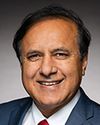Excuse me, but I don't think I've relinquished the floor yet.
We had talked at this committee, and the name of George Young had come up many times. He was, of course, former defence minister Sajjan's chief of staff during the evacuation of Kabul, and he was directly referenced to in this committee by both Senator McPhedran and Minister Sajjan. He sort of ended up becoming the nexus point, the centre, of everything that was happening with regard to the scheme that we have been studying.
It's really critical...and we haven't had a chance to hear from him yet. This is my point in this motion. We're kind of going around the edges here. We've heard different things from different people, but the fingers keep pointing back to George Young as the political operative, the chief of staff, who really was the one at the centre of this whole issue.
In some of the documents distributed to the committee by the clerk on May 3, 2023, there are multiple emails between Mr. Young and Senator McPhedran, on which ministers of the current government were copied, about the fake visa facilitation scheme. He was involved in many different communications that went back and forth with Senator McPhedran and emails on which were copied, as was said by the senator, many of the ministers involved in this here.
The problem we have is that we haven't been able to hear from the source of this. We've heard, for example, Mr. Sajjan saying that he didn't read his emails. That's not terribly helpful in this thing, and I believe it's important that we hear from Mr. Young.
No one has been able to answer the questions the committee has on these facilitation letters. Beyond the fake facilitation letters, if you recall, the senator talked about the one letter that said, “try it” and that was him suggesting to her that they didn't know if this would work. It was an attempt. They were desperate to get around the system as well as they could, so he said, here's a fake letter; why don't you just give it a try? That was the “try it” letter that Senator McPhedran referenced.
These are things we need to talk to Mr. Young about to make sure we have the facts and we have the truth at the committee.
On August 23, 2021, Mr. Young wrote the following in an email: “Thank you, Senator...I am putting it into the system. I will also ensure that Foreign Affairs is engaged to follow up, along with IRCC, so that all that...needs to be done can happen simultaneously.”
This kind of goes to the heart of the Afghanistan report and the study, because he was the nexus of this ad hoc government response. How did this happen? How do we move forward? How do we prevent this from happening more? These are the answers we need to get.
When I look at these facilitation letters—












